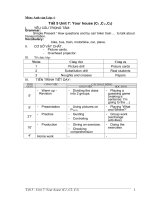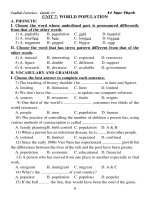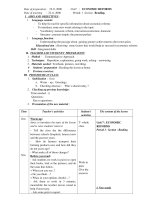Unit 7: Fiscal Policy
Bạn đang xem bản rút gọn của tài liệu. Xem và tải ngay bản đầy đủ của tài liệu tại đây (267.5 KB, 26 trang )
Group 5
Đinh Thị Nhi
Nguyễn Thị Quỳnh
Lê Thị Hồng Nhung
Unit7
Fiscal Policy
I. Vocabulary
/ pə'fɔ:məns/
/haiwei/
/tend/
/∫rink/
/defisit/
/´printiη/
/¸ʌndə´teik/
/´ʌðə¸waiz/
/'aɪdl/
/ik 'spænd/
•
/pʌmp/
•
/hɑ:m/
•
/kən´sə:nd/
•
/kəm'pounənt/
•
/ə'tempt/
•
/mein´tein/
•
/lu:s/
•
/´stimju¸leitiη/
•
/'ægrigit/
•
/ri'kwaiə/
•
/'dʒenəreitiŋ/
•
/´ʌltimətli/
•
/'preʃə/
•
/di,tə:mi'neiʃn/
•
/ˈdʒɛ.nə.ˌreɪt/
•
/,kɔris'pɔndiɳ/
•
/kənsidə'reiʃn/
•
/pə´tikjulə/
•
/,kɔmbi'neiʃn/
•
/ɪkˈspɛns/
•
/in’evitəbli/
•
/pə'lɪtɪkl/
•
/bɪ'li:f/
•
/ri:'ækʃn/
•
/sə´pɔ:t/
•
/di'fens/
•
/kən´strein/
•
/eɪd/
I. Vocabulary
/ pə'fɔ:məns/
/haiwei/
/tend/
/∫rink/
/defisit/
/´printiη/
/¸ʌndə´teik/
/´ʌðə¸waiz/
/'aɪdl/
/ik 'spænd/
•
performance -sự thi hành
•
highway-đường cao tốc
•
tend -xu hướng
•
shrink -chững lại
•
deficit -thâm hụt
•
Printing-in tiền
•
Undertake- đảm nhận
•
Otherwise- cách khác
•
Idle-thất nghiệp
•
Expand- Mở rộng
•
/pʌmp/
•
hɑ:m/
•
/kən´sə:nd/
•
/kəm'pounənt/
•
/ə'tempt/
•
/mein´tein/
•
/lu:s/
•
/´stimju¸leitiη/
•
/'ægrigit/
•
/ri'kwaiə/
•
Pump- Bơm
•
Harm- thiệt hại
•
Concerned- Có liên quan
•
Component -cấu thành
•
Attempt- Sự cố gắng
•
Maintain- duy trì
•
Loose- mở rộng
•
Stimulating- khuyến khích
•
Aggregate- Gộp chung
•
Require -Đòi hỏi, yêu cầu
•
/ɪkˈspens/
•
/,kɔmbi'neiʃn/
•
/in’evitəbli/
•
/pə'lɪtɪkl/
•
/bɪ'li:f/
•
/ri:'ækʃn/
•
/sə´pɔ:t/
•
/di'fens/
•
/kən´strein/
•
/eɪd/
•
Expense:phí tổn
•
Combination:Sự kết hợp
•
Inevitably: chắc chắn
•
Political:chính trị
•
Belief:sự tin tưởng
•
Reaction:sự phản ứng lại
•
Support:Sự ủng hộ
•
Defense:quốc phòng
•
Constrain:Bắt ép
•
Aid:Sự giúp đỡ
II. Summary
This reading have 3 main ideas :
FiscalThe influence of government spending and taxationDeficitDeficit runsTwo ways to finance deficitBorrowingPrinting more moneyDeficit spendingFiscal policyDefinitionsKinds of fiscalThe factor influencing Government’s decision on fiscal policy
•
The first is the influence of government
spending and taxation on the overall
performance of the economy.
•
The second is deficit. Deficit runs when the
government spends more than it receives. To
finance deficit, there are 2 ways: borrowing or
printing more money. Deficit spending is
spending funds obtained by borrowing or
printing instead of taxation. It is harmful or
useful for economy.
• The last, fiscal policy is a government‘s policy related to taxation and
public spending.
There are 2 kinds of fiscal policy : expansionary and contractionary.
Expansionary fiscal policy is used when taxation is reduced or public
spending is increased while contractionary fiscal policy is used when
taxation is increased or public spending is reduced.
The factors influencing Government’s decision on Fiscal policy are:
unemployment level, economics growth, inflation, political
considerations, fiscal policy of other countries and other organizations
such as : IMF, WB… so on.
III. Answer questions
1. Which way of government spending and taxation
affect the economy? Give example.
•
Government spending and taxation directly affect
the overall performance of the economy
•
Example: If government increase taxes, individual
income and corporate income will reduce, they
purchase fewer goods and the economy tends to
shrink.
Short questions.
2. When does deficit run?
•
Deficit runs when the government spends
more than it receives.
3. What is “ deficit spending” ?
•
Deficit spending is spending fund obtained by
borrowing and printing instead of taxation.
4. What is fiscal policy?
•
Fiscal policy is a government’s policy related
to government spending and revenue.
5. How many types of fiscal policy? What are
they?
•
There are two types of fiscal policy, they are
expansionary policy and contractionary policy.
1. Is deficit spending harmful or useful for
economy and when is it harmful or useful?
•
Deficit spending can be harmful or useful for
the economy. It is harmful when
unemployment rating is low or inflation is high
and it is useful when unemployment rating is
high.
Long questions.
2. When is fiscal policy expansionary or contractionary? Why?
•
Fiscal policy is expansionary when government spending is increased
or taxation is decreased. It is used when unemployment rating is high
and economy is slowing down with the aim increasing employment
level and promoting economy growth.
•
Fiscal policy is contractionary when government spending is
decreased or taxation is increased. It is used when inflation is too
high and economy is overheating with the aim keeping inflation
under the control and slowing down the economy.
3. What are the factors influencing government’s decision on fiscal policy?
•
The factors influencing government’s decision on fiscal policy are:
+ unemployment level, economic growth, inflation: when unemployment
level is high and economy is slowing down government will use
expansionary policy and inflation is too high and economy is overheating
government will use contractionary policy
+ political consideration such as beliefs about the size of the role that
government should play in the economy or the likely public reaction to a
particular course of action
+ fiscal policy of other countries, which may
tempt companies to relocate by offering them
generous tax programs or other government –
controlled benefits.
+ other organization such as IMF, which often
grants aid packages subject to conditions
relating to fiscal policy
4. Which fiscal policy is using in VietNam?
•
Vietnam is using expansionary fiscal policy
because the current global economic is
slowing down so Vietnam economy is also
weakened lead to people’s lives are difficult
and unemployment rate is high.
5. How is public debt situation in Vietnam, at the present? How do public
debt affect to the economy?
•
At the end October last year, the clock vietnam’s public debt at 76.706
billions of dollars, total loans increased by 11,8% year, accounting for
48,6% of GDP, this public debt cause:
+ repayment pressure is large
+ Economic growth has fallen
+ budget deficit and huge public debt, public debt trend is increasing
+ inflation is high and it is hard to restrain
•
In the short term, public debt is well for economic growth, it attract
foreign investment by buying government bonds.
•
In the long term, public debt is not well, if it increase too high it will
constrain economic growth.









